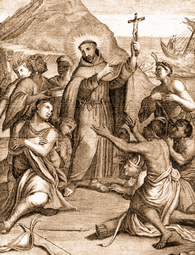Lives of the Saints
Our Models and Protectors
Spiritual Bouquet:
July 24

Saint Francis Solano
Franciscan Missionary in South America
(1549-1610)
The diocese of Cordova, in Spain, was the birthplace of this Saint, who won many thousands of souls to God. From his earliest years he was characterized by a modest behavior, prudent silence, and edifying meekness. While still very young he was always able to effect a reconciliation between the most bitter enemies. Once, when he came upon two Spaniards who were engaged in deadly strife, he threw himself between them, and kneeling down prayed with so much fervor that the fierce combatants sheathed their daggers and became reconciled to one another.
His education was entrusted to the Jesuit Fathers, but his desire to follow the poor and humble Jesus in perfect poverty and humility induced him to enter the Order of St. Francis. Soon he excelled every one in the house in humility, obedience, fervor in prayer, and self-denial. Sometimes he would pass the entire night on his knees before the tabernacle. If he saw a religious zealous for God's honor and love, he would say to him: “Brother, let us see which of us can show Jesus more proofs of love, fervor, and self-denial during this week.”
After his ordination he preached the word of God in simple, unadorned language; but with so much fervor and heartfelt emotion, that those among his numerous audience who had been traveling on the broad road of vice abandoned it, and entered upon the narrow path of a virtuous life.
He was no less zealous in deed than in word; for when the pestilence was raging in Granada he was untiring and fearless in his service to the plague-stricken inhabitants, tending the sick and dying with such assiduous and, as it were, maternal care, that the wondering people praised God for the visible protection He manifested towards His servant.
In the year 1589 he sailed for South America to preach the Gospel to the Indians in Peru. On the same vessel with him were six hundred negro slaves. While still at some distance from shore the ship struck a ledge of rocks, and the danger of drowning was imminent. The captain hurried the officers and principal passengers into the only boat there was, and tried to induce the missionary to accompany them ; but he refused to do so in these terms: “Sir, you have done your duty; now I shall do mine. I stay here.” He then consoled the remaining passengers, directing their thoughts to heaven. He knelt down with them and prayed fervently, exhorting those who had been baptized, instructing those who were not, and comforting all. Meanwhile the vessel was sinking, and the passengers trembled with fear; but not so the zealous missionary. He alone kept up his hope in God's mercy. Thus three dreadful days were passed, until at last the captain came with the life-boat and all were taken off in safety.
The missionary did not confine his ministry to Lima. He visited the forests and deserts inhabited by the Indians, who were cruel and bloodthirsty by nature, and who hated the Spaniards because they had oftentimes been cruelly treated by them. But God protected His fearless servant, to whom He had given the gifts of eloquence and power over wild beasts. Lions, tigers, and snakes obeyed him, and the birds perched on his shoulders, singing with him the praises of God. By degrees he won the trust of the Indians, who marveled at his kindness; they listened to his instruction, allowed him to baptize them, and followed him as grateful children follow their father.
In this way nine thousand Indians were converted, and everything was in the most promising condition when the missionary was recalled by an order from his Superior to Lima, which at that time was like the godless city of Ninive. Francis preached with great effect to the hardened sinners. He carried his mission everywhere — in the public streets, into the shameless theaters and gambling-dens, where, cross in hand, he frightened the evil-doers by the might of his words, which echoed like the trumpet-sounds of the last judgment. The result of his labors was that the whole city became converted.
He wrought many miracles on the sick and sorrowful, but was in himself the greatest miracle of all. Ever busy, humble, joyful, and never uttering a single useless word, in his leisure time he composed songs to the Christ-child and His blessed Mother, and sung them, to the accompaniment of his violin, so sweetly that his hearers were enraptured. His love of his neighbor was unbounded. He never thought evil of any one, and put a good construction on every action, even when persecuted, calumniated, and held in suspicion by his religious brethren.
The proverb, “As our life is, so shall be our death,” was fulfilled in Francis’ case. In his last painful sickness he prayed thus: “O Jesus! how do I deserve such grace! Thou wert nailed to the cross, and I am served by my brethren; Thou wert stripped of Thy clothes, and I am well covered; Thou didst receive blows, and I only receive good things, O my God.” His last words were, “God be praised!” after uttering which his soul departed this earth on July 14, 1610. His remains were honored by a grand funeral, and he was declared Blessed by Pope Clement X, in 1675, and canonized by Benedict XIII in 1726. St. Francis’ feast is held July 24th.
Reflection: Francis Solano knew from experience that the lives of Christians sometimes greatly hinder the spread of the gospel of Jesus Christ. Francis lived an exemplary life himself, and urged his fellow Spaniards to make their lives worthy of their baptisms.
Source: Little Pictorial Lives of the Saints, a compilation based on Butler’s Lives of the Saints, and other sources by John Gilmary Shea (Benziger Brothers: New York, 1894).